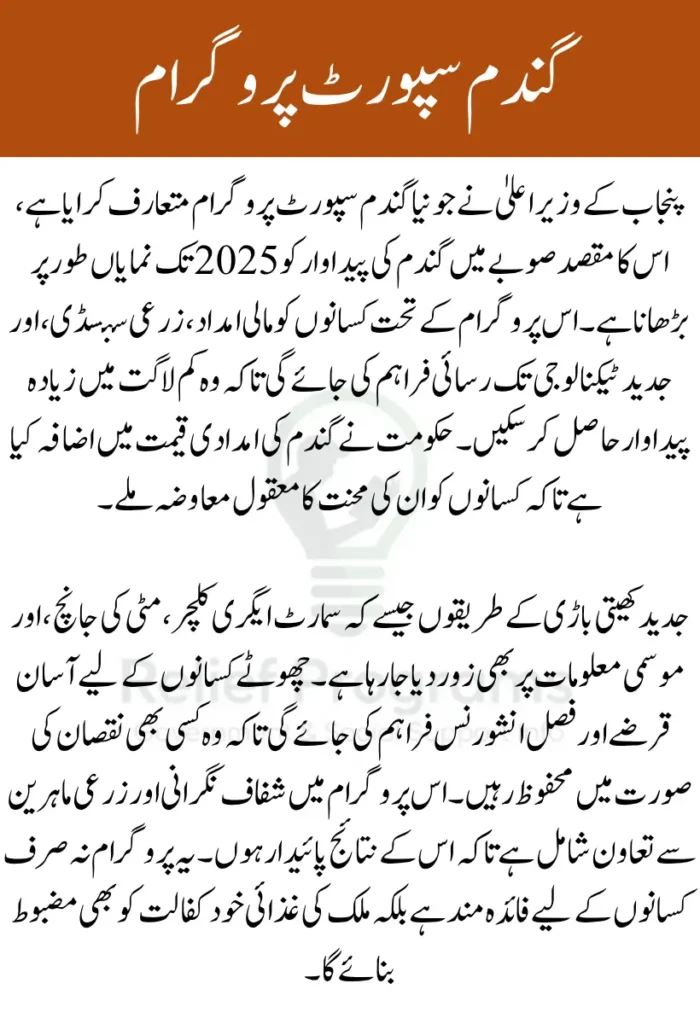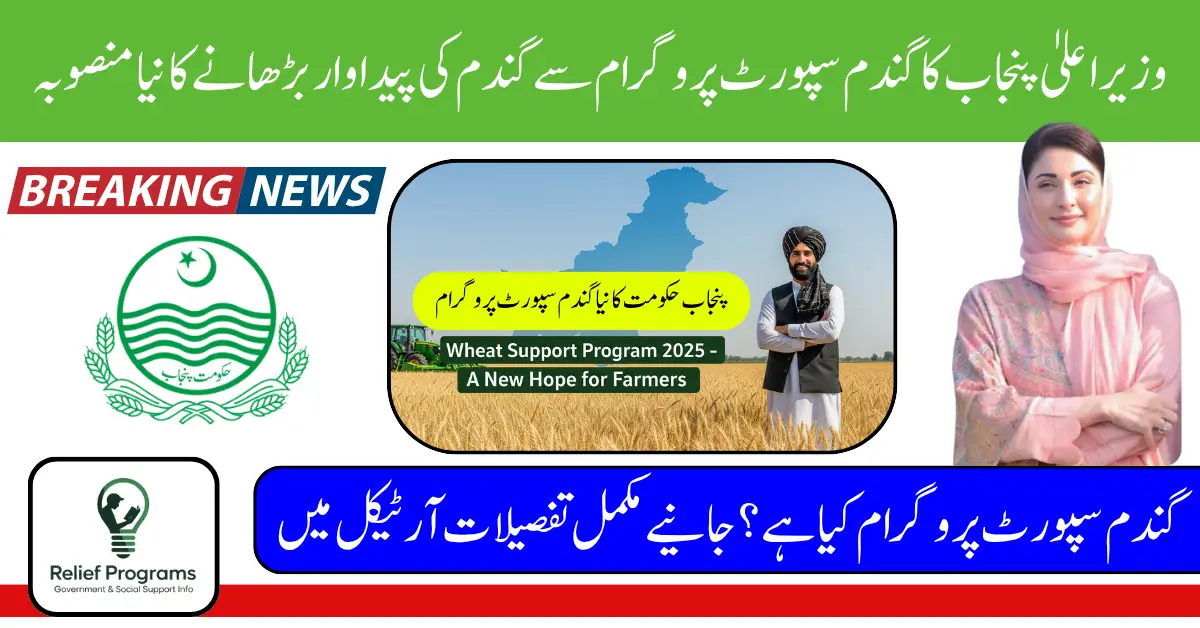Punjab, Pakistan’s breadbasket, is preparing to revolutionize its agricultural sector once again. The Chief Minister has launched a bold Wheat Support Program designed to increase wheat production by 2025. This initiative places farmers at the center, with a plan that blends government support, modern technology, and sustainable practices. It’s not just about growing more wheat — it’s about creating a stronger, more resilient agricultural future.

With fluctuating wheat prices, climate challenges, and rising input costs, farmers have struggled in recent years. The new Wheat Support Program aims to reverse this trend by making wheat cultivation more profitable and efficient. Through a mix of subsidies, education, and field support, the government hopes to bring long-term relief and real results to the farming community.
For More Information: BISP Biometric Failure Solutions for Fingerprint Verification Issues
CM Punjab’s Wheat Support Program
The cornerstone of this program is direct aid to wheat growers. Farmers will receive subsidized seeds, fertilizers, and machinery to reduce the cost of production. By lifting this financial burden, the government is making wheat farming more accessible — especially for smallholders.
پنجاب حکومت نے کسانوں کی حالت بہتر بنانے کے لیے گندم سپورٹ پروگرام کا آغاز کیا ہے، جس کا مقصد 2025 تک گندم کی پیداوار میں نمایاں اضافہ کرنا ہے۔ اس پروگرام کے ذریعے کسانوں کو سستی کھاد، معیاری بیج اور جدید مشینری فراہم کی جائے گی تاکہ وہ اپنی فصل بہتر طور پر اگا سکیں۔
Program Overview
| Key Feature | Description |
| Government Subsidies | Support on seeds, fertilizers, and machinery |
| Minimum Support Price Increase | Higher wheat prices to benefit farmers |
| Use of Smart Technology | Weather tools, soil testing, mobile crop apps |
| Farmer Training | Sessions on modern and sustainable farming practices |
| Financial Relief for Small Farmers | Low-interest loans and crop insurance |
| Efficient Irrigation Methods | Drip irrigation and laser leveling to save water |
| Soil-Based Fertilizer Distribution | Tailored fertilizer use based on soil analysis |
| Research Collaboration | New seed varieties developed with agricultural experts |
| Monitoring & Evaluation | Transparent tracking of program implementation |
| Strengthening Food Security | Reducing imports and increasing national wheat reserves |
Better Returns Through Support Prices
The program features an increase in the minimum support price for wheat. This ensures that farmers can sell their produce at a profit, making wheat a more attractive crop choice in the upcoming seasons.
For More Information: BISP Kafaalat Program 2025 – CNIC Check
Adoption of Smart Farming Tools
To modernize farming practices, the Wheat Support Program introduces smart technology tools. These include weather tracking systems, satellite imaging for crop health, and mobile apps to guide planting and irrigation.
- Real-time weather alerts to reduce crop loss
- Soil testing kits for accurate fertilizer use
- Mobile tools for pest and disease detection
Farmer Education Initiatives
Another essential aspect of the program is farmer training. Sessions will be held across Punjab to teach efficient sowing techniques, modern irrigation methods, and post-harvest management. These skills are key to maximizing productivity with fewer resources.
نئے پروگرام میں کسانوں کی تربیت کو بھی خاص اہمیت دی گئی ہے۔ انہیں جدید زرعی طریقوں سے روشناس کرایا جائے گا تاکہ وہ کم وسائل میں زیادہ فائدہ حاصل کر سکیں۔ اس میں پانی کی بچت، زمین کی بہتر تیاری اور جدید طریقہ کاشت شامل ہیں۔
For More Information: Ehsaas Program 8171 New Updates for Beneficiaries
Support for Small-Scale Farmers
Recognizing the challenges faced by small farmers, the program offers low-interest agricultural loans and crop insurance options. This gives farmers financial confidence and reduces risks associated with climate or market changes.
Promoting Efficient Water Use
Punjab’s water resources are under pressure. The Wheat Support Program promotes water-saving techniques such as laser leveling and drip irrigation. These practices help conserve water while increasing yields.
Smarter Fertilizer Use
Instead of blanket fertilizer distribution, this program focuses on region-specific soil analysis. Farmers will receive recommendations based on their land’s actual nutrient needs, improving soil health and reducing waste.
For More Information: 8171 Check Payment Status by Using SMS Update
Partnering with Agricultural Experts
To ensure innovation, the government is working with agricultural universities and experts to develop new, high-yield wheat varieties. These seeds are better suited to Punjab’s climate and offer stronger resistance to pests and disease.
چھوٹے کسانوں کے لیے قرضہ جات اور فصل انشورنس کی سہولت بھی دستیاب ہوگی۔ یہ اقدامات کسانوں کو مالی طور پر مستحکم کریں گے اور گندم کی کاشت کو ایک فائدہ مند پیشہ بنانے میں مدد دیں گے۔
Transparent Progress Tracking
The program includes a clear system for tracking progress. From seed distribution to final harvest data, every step will be monitored. This ensures transparency and helps improve the program year after year.
Building Food Security for Pakistan
At its core, the Wheat Support Program aims to reduce dependence on imports and protect Pakistan’s food supply. By increasing local production, it secures the country’s wheat reserves for the future.
Conclusion
The Wheat Support Program introduced by the Chief Minister of Punjab marks a crucial turning point for the province’s agriculture sector. By focusing on real needs—like fair pricing, access to modern tools, farmer education, and financial relief—this initiative addresses both the current challenges and long-term goals of wheat production.
